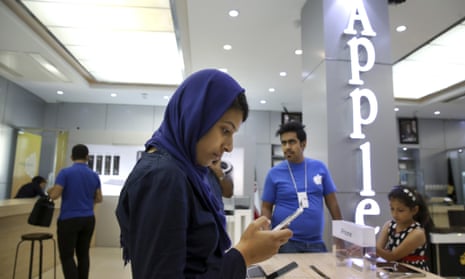When I travelled to Tehran last summer to speak at an energy conference, I was inundated with a range of technical questions I couldn’t answer. Young men and women asked for drafts of my presentation, and later emailed me with queries, so revealing how educated and skilled is Iran’s rising generation.
The debate at the conference over Iran’s best model for economic growth - and whether it should expand ties with both Russia and the United States - illustrated a broad consensus in Iran on the importance of independent development and of attracting the kind of investment that will support this. The Islamic Republic’s founder Ayatollah Ruhollah Khomeini’s slogan of “neither east, nor west” summed up this aspiration.
Just after the Iran-Iraq war ended in 1988, there was a rumour McDonald’s was opening, so despite the possibility it was an imitation, I drove four female relatives to be among the first customers. But protestors on motorcycles threatened to smash our car, as they had just smashed the windows of the new burger joint, if we tried to eat there.
After Tehran’s nuclear agreement with world powers, many outside businesses are enthusiastic about the Iranian market, but the potential should not be seen through rose-tinted glasses. While the government of President Hassan Rouhani will not condone hardliners opposed to any western presence, scepticism over foreign intentions is an age-old feature in the Iranian political psyche.
Many ministers and advisors are battle-hardened by economic management in trying times, having held senior positions during the war with Iraq, when Iran had scant access to foreign investments or technology. More recent history, when foreign companies pulled out in the face of US sanctions, tells Iran it cannot trust outside investors.
Hence Rouhani and his government are determined to secure solid commitments that foreign partners respect Iran’s growth model. And with no guarantees that sanctions might not return, Iran will condition investment to best support its perceived long-term needs.
Mohammad Reza Nematzadeh, the industry minister, embodies these goals. Following a meeting with European Union business leaders held after the nuclear agreement was reached in July, he said foreign investment should be based on 50:50 arrangements with Iranian private and public sector partners.
Nematzadeh laid out further, specific conditions for the re-entry of French car manufacturers. Iran would keep its domestic assembly lines, which operated before companies like Peugeot and Renault pulled out staff and investment in 2012-13 due to sanctions. Iran also wants to export Iranian-made models of French cars to regional countries to generate non-oil revenue, which Nematzadeh said Iran would triple in two years.
A similar approach is clear in the oil sector, the country’s most lucrative revenue source. Amir Hussein Zamannia, deputy oil minister for international affairs, said this week that attracting foreign investment was a secondary concern. “The money comes,” Fars news quoted him as insisting, given the easing of sanctions will lead to higher oil exports and the unblocking of Iran’s frozen overseas assets.
Zamannia said foreign investors would be screened as to how well they would contribute to developing indigenous technical and human capacities. In other words, they are expected to transfer technology and know-how, and to support the Iranian private sector.
The oil ministry is itself gearing up to implement a wider government commitment to boost the private sector, with Bijan Namdar Zanganeh, the minister, stressing he aims to privatise as much downstream work as possible.
The oil ministry is also planning to replace the ‘buy back contract’, which offered foreign companies investment opportunities in the energy sector over relatively short periods in return for a fixed amount of production, with the ‘integrated petroleum contract’, which would be longer and entitle the investor to a percentage share of the oil produced.
How realistic is Iran’s approach? There are two main problems.
Firstly, Iran will remain short of capital. With low oil prices, it cannot depend on oil revenue to raise sufficient funds to match foreign investment. In the first 23 days after the nuclear deal Iran ‘lost’ $214m as prices fell $7.50 a barrel. Saudi Arabia will continue to pump oil to keep prices down, partly to keep Iran in check until it halts support for Iran’s allies in Iraq, Syria and Yemen.
Secondly, would-be investors may not like tough terms or being treated with suspicion. While McDonald’s is today advertising franchises in Iran, hardliners are charging the company with spying for the US government through its global outreach. This is an extreme example of a wider issue.
High expectations of what foreign investors must do to satisfy Iran are understandable, but they may well not be met, especially if firms are unwilling to transfer sensitive technologies. For now, Tehran risks sending mixed signals to investors, and turning some away.
Follow the author on Twitter at @BanafshKeynoush
